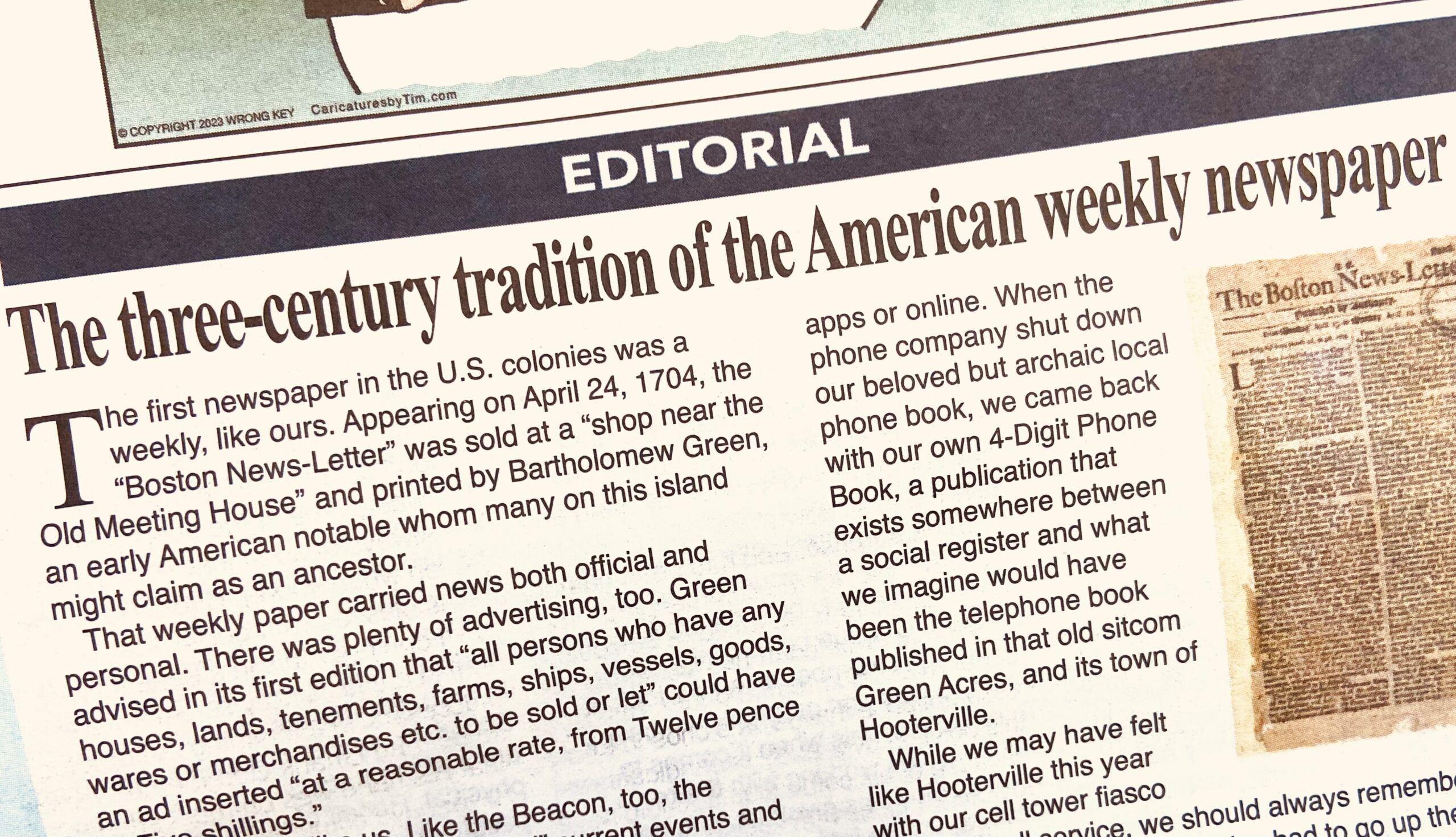Editorial: The value of the weekly American newspaper

The first newspaper in the U.S. colonies was a weekly, like ours. Appearing on April 24, 1704, the “Boston News-Letter” was sold at a “shop near the Old Meeting House” and printed by Bartholomew Green, an early American notable whom many on this island might claim as an ancestor.
That weekly paper carried news both official and personal. There was plenty of advertising, too. Green advised in its first edition that “all persons who have any houses, lands, tenements, farms, ships, vessels, goods, wares or merchandises etc. to be sold or let” could have an ad inserted “at a reasonable rate, from Twelve pence to Five shillings.”
Sounds a lot like us. Like the Beacon, too, the News-Letter had “paper of record” current events and goings on at the docks. Plus pirates. The first edition told of a poor Capt. Tongrelio, who had taken five ships off of Curacao but was “wounded through the body.”
That the newspaper of 1704 bears so much resemblance to our weekly paper three centuries later is heartening. We guess that Green, who sorted through trays to place type letters on a sheet-by-sheet press, would be amazed not only by the wonders of our electronic PDF edition, but also by our Boca Beacon and Boca Grande apps and the immediacy of BocaBeacon.com.
Technology might have changed, but like in 1704, each letter must be typed individually by someone and printed (for us in Venice). Another parallel to 1704, is that our Boca Grande postmaster is key to distribution.
Nationally, there is sadness and worry in the slow demise of so many newspapers. You may have lost your own local weekly. Or the daily paper that you had been accustomed to has dwindled into a few pages of wire copy, sometimes not even daily. Thousands of papers have folded, and towns have lost their voice, creating what the industry calls a “news desert” where there is no advocate or voice of the people. But in Florida and across the nation, where there is local ownership, newspapers do survive, and even thrive. Like the Boca Beacon, our cohorts in Florida towns such as Monticello, Gulfport and Sarasota still have strong weeklies.
The Boca Beacon will continue to thrive. Remember that it was almost 30 years ago when Americans first discovered web browser and online news, and we have adapted well to that, all the while keeping our essential print operations healthy.
We have had to be innovative, and not just with our apps or online. When the phone company shut down our beloved but archaic local phone book, we came back with our own 4-Digit Phone Book, a publication that exists somewhere between a social register and what we imagine would have been the telephone book published in that old sitcom Green Acres, and its town of Hooterville.
While we may have felt like Hooterville this year with our cell tower fiasco and poor cell service, we should always remember that Oliver Douglas and his wife Lisa had to go up the phone pole to make a call, or go into Mr. Haynie’s store, where the cord was short because they ran out of line.
But we are not Hooterville’s Hooter World Guardian. In that case, the pig Arnold Ziffel delivered the paper by Radio Flyer wagon (not golf cart), and it was run by the (slightly) sensible Mr. Drucker, who seemed to be one of the few half-sane folks in town. Our small town vibe (as so many describe us) is, we hope, closer to Mayberry. Often times this island can feel quite perfect, like many of us are re-enacting a sort of coastal small-town America, with the Boca Beacon as our own Mayberry Gazette. We take that as a compliment, for the seemingly vanished life seen in that small North Carolina town exemplifies the values we all cherish, no matter our income or position. But unlike fictional Mayberry, our protected town is quite real, and far more entertaining.
The Boca Beacon is blessed. We have a highly educated audience that not only values what we do, but has the time and means to support us. For that we are grateful. We will never waste that opportunity.
Over the years, through new editors and writers, we have tried to keep our voice as an independent one whose only mission is to serve these islands and all of their people.
We welcome your ideas, stories, op-eds, wishes and essays. And in particular, we value your letters to the editor, sane or silly.
- New Farlow’s restaurant Chophouse285 anchors Englewood’s Dearborn Street
- Schmaltz & Pepper for All That Jazz
- Charlotte meets on beach access; Placida park project moves forward
- World of mangroves the subject of conservation lecture series talk at Englewood Chamber of Commerce
- Magano at Camera Club talks on light-painting and photography









